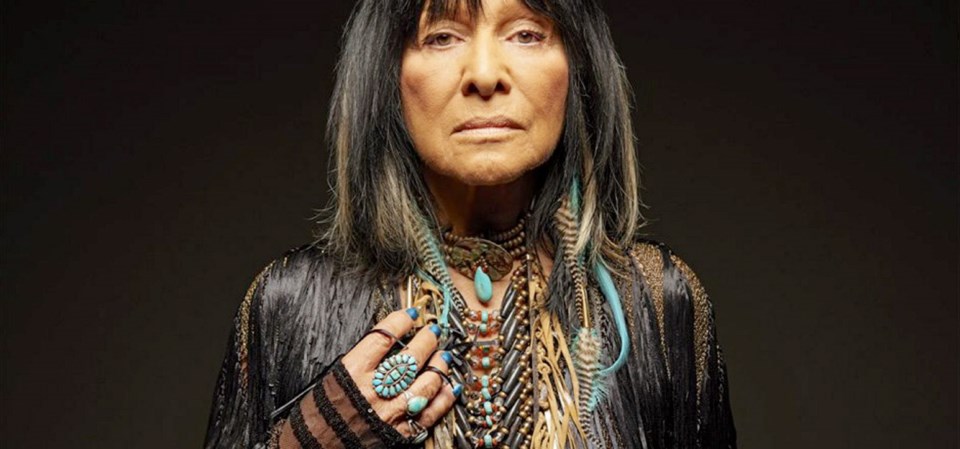What: Buffy Sainte-Marie
When: Sunday, 2:30 p.m.
Where: Charlie White Theatre, Mary Winspear Centre (2243 Beacon Ave.), Sidney
Tickets: Sold out
Note: Sainte-Marie also performs April 28 at Fulford Hall on Salt Spring Island and April 29 at The Tidemark Theatre in Campbell River
There is no discernible pattern when it comes to the career of Buffy Sainte-Marie. In fact, not even Sainte-Marie knows when she’s going to make an album or go on tour. Only when the mood strikes does her music career come to the fore.
“I’m always taking time off,” Sainte-Marie said from her home on the Hawaiian island of Kauai, where she has lived for more than 40 years. “I’m always surprised that anybody knows I’m still in this world.”
Sainte-Marie, 74, has the type of spirit that makes forgetting her an impossibility. On tour, she often splits duties between public speaking at universities and concerts in theatres. Not surprisingly, tickets for both are often difficult to come by.
That has as much to do with her career accomplishments as it does her reputation for stirring live performances. Audiences will see it first-hand at the Charlie White Theatre in Sidney, Fulford Hall on Salt Spring Island, and The Tidemark Theatre in Campbell River during upcoming dates.
“I’m kind of a big mouth,” Sainte-Marie said with a laugh. “I’m not shy.”
Indeed, she is not. Sainte-Marie makes that abundantly clear on her new recording, Power in the Blood, which is due for release on May 12 through True North Records. Her first album since 2008’s Running for the Drum has been gestating for years now, she admitted. But seeing that it’s ready for release, she cannot wait to showcase her new songs for audiences.
As for expectations on how it will sell, or how critics will receive it, or who will even listen to it, she doesn’t attempt to guess. That it even exists is an accomplishment in and of itself, she said. “I never expect anything, really. I’m so happy to be a songwriter — I’m even surprised when I get to record anything. I consider it a considerable privilege and a blessing to have a medium of expression that has a place in the world.”
Sainte-Marie updated songs by UB40 and Alabama 3 on Power in the Blood, and offers new versions of her old material. The opportunity to redo songs such as Not the Lovin’ Kind, which she released in 1972, was too good to pass up. She said the same about It’s My Way and Generation, which were written during Sainte-Marie’s “blacklist years,” when her personal politics prompted two separate U.S. presidents to limit the airplay of her and other activists.
There are no such threats these days, which is a good thing for Sainte-Marie, who is free to make art on her own terms. Most artists “hammer away at it like they’re capitalists,” she said. She lets decisions hang on the vine until they ripen. “Every now and then, when I feel like touring, I’ll record. There’s no sense recording if you’re not going to tour, because nobody will hear the record.”
Putting music in the hands of her fans hasn’t always been easy for Sainte-Marie, due to her lengthy layoffs. One of her best albums, Coincidence and Likely Stories, went unnoticed in 1992, largely because it was her first new album since 1976. Did she worry? Sainte-Marie all but laughed at her ineffectiveness as an artist. “There have been albums I thought were going to do well because they were timely. Coincidence and Likely Stories had songs about the Iran-Contra affair, and had a lot of real nice global imagery. But nobody ever heard it.”
She admits to causing a lot of “stumbling blocks and pitfalls” in her career, but regrets nothing. Her first tour was in 1962, so she has had plenty of time to get over what did not come to pass career-wise, and why.
For Sainte-Marie, real life always trumps what she calls “le showbiz.” She’s an Oscar, Juno, and Golden Globe winner. And yet, she identifies more as a real person than famous performer.
“My private life has really informed my career life as well. I tend to be real healthy. I take ballet and flamenco classes — who does that? I do it because it’s really fun. It’s my football or my poker. I do it because it happens to be healthy for me.”
At home in Hawaii, she has a garden on her farm, along with animals.
“It keeps me natural. People use words like grounded and focused. But I call it plain being natural. When you go out and hug your horse, and it hugs you back, that’s a very good feeling.”
Her commitment to social causes has prompted many to call Sainte-Marie a warrior. The singer and activist, who was born on a Cree reserve in Saskatchewan’s Qu’Appelle Valley, bristles at the suggestion.
“It’s not a matter of wanting to be one, I’m just not one. A warrior is someone who kills people, and makes war on people. It’s a very specific word. I don’t think we should throw it around. ‘You’re a warrior for peace!’ Oh, sit down. I don’t think it’s a compliment. Everybody thinks it means you’re hot. I don’t think it does. It’s inaccurate.”
When asked how she would like to be remembered, Sainte-Marie skirted the issue in her typically modest fashion. If she happened to change things while she was alive, that’s all the good news she needs to hear.
“I’ve had enough success, so that I’ve had several real lives. But I still get to make music and play for friends, so I really have a wonderful life.”

-thumb.png;w=120;h=80;mode=crop)

